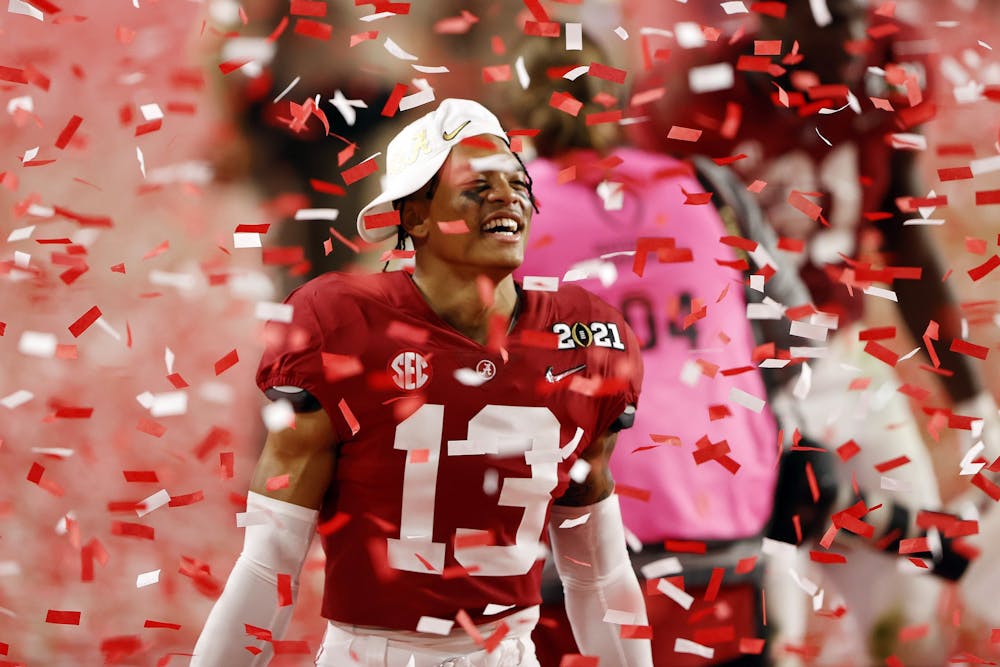Before the 2014 season, the College Football Playoff and its committee were brought in to find the best teams in college football and have them compete for the national championship. It hasn’t done that.
Many people felt the Bowl Championship Series’ fully computerized system was flawed, especially after the 2012 National Championship between the University of Notre Dame and the University of Alabama. The computers had no ability to watch the games and its system was skewed toward specific conferences and schools.
In comes the CFP Committee made up of various schools’ athletic directors who actively choose not to watch the games and deliberately skew rankings to get the best matchups for ratings and money for their conferences. With this, we find ourselves in the exact same situation as we did a decade ago — teams like Notre Dame getting blown out by Alabama in the postseason because they were overvalued by the powers that be.
The only difference being that 13 human beings who are more crooked than Iowa athletic director Gary Barta’s teeth made the decision to put the Irish in over Texas A&M or an undefeated University of Cincinnati instead of a group of computers.
So what about this season?
Despite the CFP rhetorically asking “Who’s In?” in every commercial for the past seven years as if all 130 Football Bowl Subdivision schools have an opportunity, only a select few have a real shot this season. Alabama and Clemson have sports locked up at this point, and an undefeated Ohio State would also get in, leaving one hypothetical spot left.
However, it will be reserved for teams that bring in the most revenue, like Oklahoma, Notre Dame or Georgia.
This leaves teams like little old IU, one of the few likable programs in the cesspool of college football, out in the cold. They, like many other deserving teams, like the University of Cincinnati or Iowa State, have most likely already been removed from contention to play for a national title by the committee because they don’t have a history of success like other programs.
IU didn’t earn a New Year’s Six bid last season with its only blemish being a one-score loss to Ohio State on the road. Even if they went undefeated, IU would face an uphill battle against the institution of the CFP.
Even with the proposed expansion to 12 teams, up-and-coming schools like IU will be overlooked in favor of teams like Texas and Michigan, who aren’t elite anymore, but have name recognition and brand value much larger than the talent of their current teams. Schools like Notre Dame will almost always have a shot, despite them proving time and time again that come January, they get turned inside-out just like the jackets of their fans.
If anything, expanding to 12 gives the committee even more of an iron fist over the landscape of the sport, as the line for “deserving” teams expands and becomes more blurred. Combined with the upcoming 16-team superconferences, college football is experiencing unprecedented change for the worse.
College football is currently in the process of losing the one thing that sets it apart from the rest of the American sportscape: its soul. A game rooted in intense regional rivalries, decades-old traditions and singing the fight song with your classmates and alumni has turned into an emotionless, corporate cash grab.
Much like ESPN, college football is being driven into the ground by the rich and powerful. Of course, the people who are most deserving of all of that revenue — the student athletes — won’t see a dime of the money they produce for their billion-dollar schools and conferences.
Fans will begin to stop caring about the feel-good stories like IU, Cincinnati and Coastal Carolina if they know that none of it matters in the grand scheme of the season. The sport known for its spirit will be defined by its apathetic fans and soulless corporations, becoming little more than a nationally televised NFL tryout for student athletes.
College football will continue to be popular. However, if its most powerful institutions continue to tear the sport down by prioritizing ratings and brands over the spectacle, the pageantry and passion that has defined its 152-year existence, it will struggle to find a permanent home in people’s hearts like it has in the past.




